From “Mother Jones” to Yoga Jones: Can The Media Stop Private Prisons?
For-profit incarceration gets some high-profile coverage
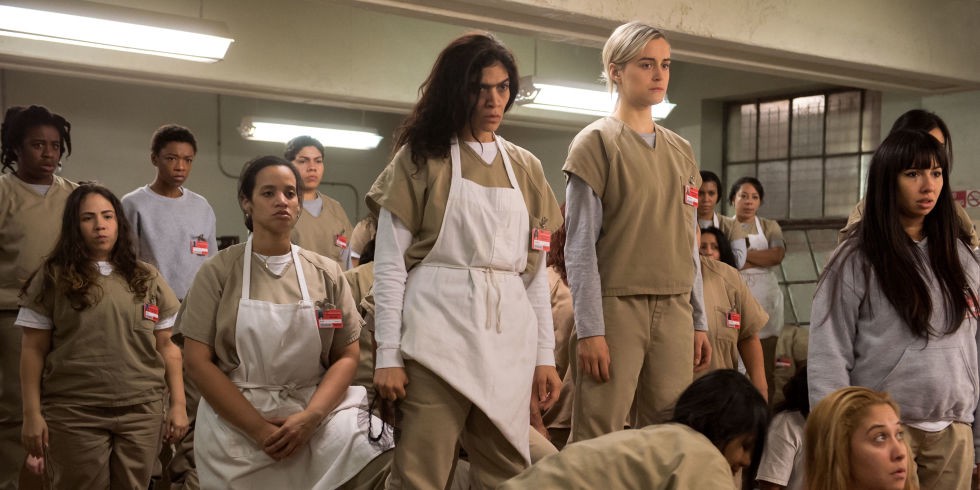
Warning: Spoilers ahead related to Season 4 of “Orange is the New Black”
Join me as I take a brief break from pointing out the evils of America’s money-making, morally bankrupt health insurance system to point out the evils of America’s money-making, morally bankrupt penal system. As a reward, I’ll throw in some gifs! Mmmhm?
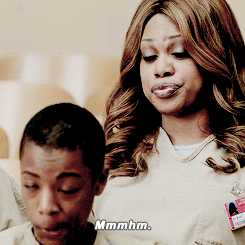
To begin: I’m sure you’ve seen this #longread exposé by Mother Jones reporter Shane Bauer titled “My Four Months As A Private Prison Guard.” But have you started reading it?
Private prisons are shrouded in secrecy. I took a job as a guard to get inside-then things got crazy
I know, I know, it may look intimidating. It’s broken up into five chapters, which makes it, like, The Brothers Karamazov of Internet journalism; it’s tackling super grim subject matter; and it’s appearing in an earnest, lefty publication not known for its sense of humor. It seems, in short, like I’m suggesting you eat your vegetables. Well, I am. I’m a mom now; that’s my fucking job. But, like your vegetables, in all probability, this article is so well-prepared that, once you start in, you’ll discover it’s fine — even tasty.
It’s also seasonal. Because at the same time that this example of old-fashioned investigative journalism caught everyone’s attention, so did the fourth season of the award-winning Netflix hit Orange is the New Black. This time around, the show’s Big Bad is rapacious American capitalism, as embodied by the for-profit prison company MCC.
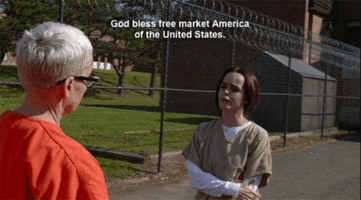
Last season, MCC took charge of Litchfield Penitentiary. As I wrote then, the ensuing changes were for the most part unpleasant but not devastating, like slop for food and the opening of a sweatshop where, for $1 an hour, inmates made women’s underwear. The exception came towards the end of the season when Sophia (Laverne Cox) was consigned to solitary by her corporate overlords — ostensibly for her own protection and actually because they weren’t willing to do what was needed to keep her safe.
Sophia’s situation serves as foreshadowing for the rest of the prisoners. To the MCC suits, she isn’t a person but a widget, one that can be tossed out of sight into a box. To the terrifying new guards brought in to maintain order in S4, she’s worse than a widget: she’s an animal. All of the inmates are.
Remember, Litchfield is a minimum-security women’s prison. Most of the people incarcerated there were convicted of low-level, non-violent offenses. Poussey Washington (a glowing Samira Wiley), for example, got six years for trespassing and possession of less than half an ounce of marijuana. (The show communicates that sentencing is not merely bonkers but often racist via a flashback to a time when clueless white CO Baxter Bayley [Alan Aisenberg] was caught trespassing and smoking pot and was then let off by genial cops because boys will be boys.)
Even if the inmates at Litchfield were “hardened criminals,” it wouldn’t be right to strip them of their humanity, as the intriguing “Personality” episode of Invisibilia reminds us. But it’s especially unjust when many of them were arrested for the same kinds of poor choices people everywhere make over the course of a lifetime.
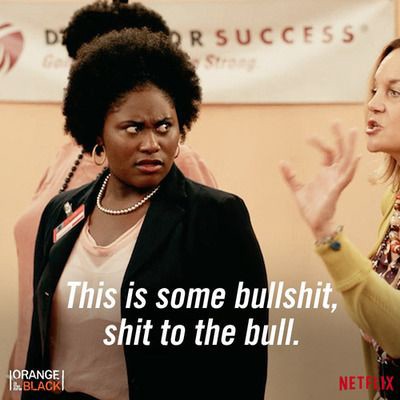
Louisiana’s Winn Correctional Center, at which Bauer served undercover as a guard, is similar to Litchfield: it’s a medium-security prison. One fellow guard tells Bauer, “‘the vast majority is in here for bein’ stupid enough to smoke a joint too close to a school.’” Yet situations there escalate quickly too, in large part because the corner-cutting company that owns it, CCA, runs the place like a damned social experiment from the 70s. Here’s Fusion’s Adam Weinstein, summarizing Bauer’s piece.
CCA receives about $34 a day per inmate from the state of Louisiana; to realize a profit, the company has to scrimp on prisoners’ food, medical care, and education. It also has to run with as little staffing as possible — sometimes as few as two corrections officers for hundreds of inmates — leaving $9-an-hour guards like Bauer undertrained, ill-equipped, vulnerable, lonely, and inclined to unchecked cruelty to stay atop of the situation. (“In the entire prison of more than 1,500 inmates, there are no full-time psychiatrists and just one full-time social worker,” he writes.)
In its indictment of prison sweatshops, an Alternet write-up quotes an expert who says, “mixing the profit motive with punishment only invites abuse.” That feels even more true of the private prison system overall than of the sweatshops within them. In Season 4, OITNB moves on from the Whispers panty factory, at which hijinks can ensue, to the more sobering — and, soon enough, appalling — realities of day-to-day life under under-trained, unchecked, trigger-happy, power-hungry guards.
Those kinds of guards, Bauer makes clear, are a fact of life at private prisons nationwide. The results are often disastrous. Here’s what Bauer is told by a supervisor at his orientation about stopping fights between inmates, or rather, not bothering to stop fights.

Happy cutting! Jesus.
And then there’s the violence the prisoners experience at the hands of the guards themselves.
I enter Cypress briefly after SORT takes over. At 6:30 in the morning, the air is so saturated with pepper spray that tears stream down my face. The key officer is doing paperwork in a gas mask. A man screams and flails naked in a shower, his body drenched with pepper spray. Cockroaches run around frantically to escape the burning.
If you tried to put that on TV, no one would believe you.
The world OINTB depicts may not be quite that apocalyptic. Still, from its ramp up mid-season — when one particularly sadistic CO puts a gun to an inmate’s head and, like he’s staging his own personal episode of “Fear Factor,” forces her to swallow a baby mouse — to its explosive, fatal conclusion, OINTB serves as an effective takedown of for-profit prisons. Although the show usually makes a point of humanizing guards and prisoners alike, it has nothing good to say about Linda from Purchasing or the other craven, callous bureaucrats at MCC. They are irredeemable — not because of who they are, but because of what they have chosen to do.
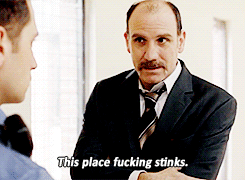
Can the show help change anything? Some of the actors hope so. In an interview with The Hollywood Reporter, Danielle Brooks, who plays the irrepressible Taystee, says, “I want us as a country to be just as invested in real lives as we are in fake characters.”
Bauer describes some of these real lives in chilling detail. Of one unlucky prisoner, he writes, “For removing a broom from a closet at the wrong time, this inmate will stay in prison an extra 30 days, for which CCA will be paid more than $1,000.” Then there’s the story of Robert Scott, who, Bauer reports, is suing CCA for the loss of his limbs and fingers.
One day, I meet a man with no legs in a wheelchair. His name is Robert Scott. (He consented to having his real name used.) He’s been at Winn 12 years. “I was walking when I got here,” he tells me. “I was walking, had all my fingers.” I notice he is wearing fingerless gloves with nothing poking out of them. “They took my legs off in January and my fingers in June. Gangrene don’t play. I kept going to the infirmary, saying, ‘My feet hurt. My feet hurt.’ They said, ‘Ain’t nothin’ wrong wicha. I don’t see nothin’ wrong wicha.’ They didn’t believe me, or they talk bad to me — ‘I can’t believe you comin’ up here!’”
The stories of pregnant women are even more heartbreaking. And the guards suffer too.
Research shows that corrections officers experience above-average rates of job-related stress and burnout. Thirty-four percent of prison guards suffer from post-traumatic stress disorder, according to a study by a nonprofit that researches “corrections fatigue.” That’s a higher rate than reported by soldiers returning from Iraq and Afghanistan. COs commit suicide two and a half times more often than the population at large. They also have shorter life spans. A recent study of Florida prison guards and law enforcement officers found that they die 12 years earlier than the general population; one suggested cause was job-related stress.
So, can anything change? Could the Federal Government, at least, be convinced to pull their contracts with private prisons? Piper Kerman, who wrote the memoir on which OITNB is based and who calls private prisons “horrific,” hopes so. And there is some precedent, Bauer recounts. The state of Idaho stopped working with CCA.
In Idaho, CCA was accused of ceding control to prison gangs to save money on wages. A lawsuit filed in 2012 by eight inmates at the Idaho Correctional Center alleged there was effectively “a partnership between CCA and certain prison gangs,” in which gang members were used to discipline inmates. A subsequent FBI investigation found that employees had falsified records to cover up their understaffing of mandatory positions.* A confidential CCA memo that was disclosed in the case showed that inmate-on-inmate assaults were four times more frequent in the CCA prison than in all other Idaho prisons combined. No charges were brought against CCA, but the state pulled its contract. “It was a lot better than this place,” an out-of-state guard who worked in Idaho at the time told me.
At some point, Bauer hears that the Louisiana DOC “has been taking a closer look at Winn’s day-to-day operations.” And in his epilogue, Bauer reports that CCA has voided its contract for the prison. Don’t cheer yet, though. It is replaced by a different private company, LaSalle Corrections.
With any luck, and perhaps with the pressure applied by the general reaction to Bauer’s piece, maybe the Feds will wake up to the fact that allowing corporations to profit off of mass incarceration is neither efficient nor cost-effective. Frankly, it’s immoral: it incentivizes choices that destabilize families, and even communities, like putting more people behind bars, keeping them there for longer stretches of time, and brutalizing them. If people aren’t “hardened criminals” when they disappear into a place like Winn, they might well be by the time they get out. After all, how can we expect inmates to emerge as rehabilitated, productive members of society when they’ve spent years in a place that makes Mad Max look civilized?
It’s not likely that putting the horror of private prisons in the spotlight on television and in magazines will nudge the Obama administration toward a different approach. But it’s possible. After all, post-Season 3’s dirty undies storyline, “the used panty business exploded.”
Support The Billfold
The Billfold continues to exist thanks to support from our readers. Help us continue to do our work by making a monthly pledge on Patreon or a one-time-only contribution through PayPal.
Comments